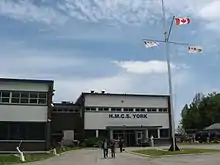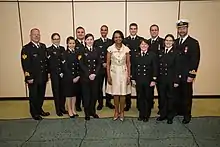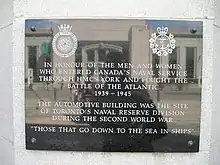HMCS York
HMCS York is a Royal Canadian Navy Reserve Division (NRD) located in Toronto, Ontario. Dubbed a stone frigate, HMCS York is a land-based naval establishment for part-time sailors as well as a local recruitment centre for the Canadian Naval Reserve.
| HMCS York | |
|---|---|
 HMCS York in 2009 | |
| Active | 1923-Present |
| Country | |
| Branch | |
| Type | Naval Reserve Division |
| Role | Reserve unit |
| Size | Approx. 300 sailors and officers |
| Garrison/HQ | 659 Lake Shore Boulevard West Toronto, Ontario M5V 1A7 |
| Motto(s) | Bon Espoir (Good hope) |
| Colours | Azure Blue and White |
| Equipment | 24 ft (7.3 m) RHIB (ZH-733 CDO) |
| Battle honours | Pre-The First World War
Post-The First World War
|
| Commanders | |
| Current commander | Commander Walter Moniz, CD |
History
The unit was established in 1942 to replace the Royal Canadian Navy Volunteer Reserve Half Company created in 1923.[1] During World War II, it was a premiere naval recruiting depot in the British Commonwealth through which over 17,000 personnel passed during the years of the war.
HMCS York was named after the original name of the city of Toronto and the first British commercial craft on Lake Ontario.[2]
York is home to the Canadian Forces Sailing Association's Toronto establishment.
Athletics
During the Second World War, Toronto HMCS York fielded a football team in the Ontario Rugby Football Union (ORFU). Some of the notable players and coaches associated with the team were: Royal Copeland, Steve Karrys, Bob Stewart and the coach Teddy Morris.
Facilities
Although located on the Lake Ontario shoreline, York has no facilities for naval ships. Rigid-hulled inflatable boats (RHIB) are deployed at the division, but the mooring facilities to the south of HMCS York belong to Toronto's branch of the Canadian Forces Sailing Association, National Yacht Club and Alexandra Yacht Club, and are for pleasure craft and such working vessels as serve the clubs.
Prior to 1947, the division was located at two other locations:
1395 Lake Shore Boulevard West: 1926–1959[3]
- home to Sea Cadet Corps and the Navy League of Canada (RCSCC Vanguard merged with RCSCC Haida, Ark Royal and the Navy League Wrenettes Corps in 1958) until 1959
- sold Rameses Shrine Temple which remained here until 1983 when it became home to the Royal Canadian Legion Branch 344
Canadian National Exhibition Automotive Building: 1942–1947
HMCS York moved to its current location in 1959.
Band

HMCS York parades one of the five Canadian Forces Naval Reserve Ship's Bands in Canada. The band is a professional brass and reed band with approximately 30 members. Their primary operational and training period is from September to May.[4]
The band is composed of the following assets:
- Brass quintet
- Jazz combos
- Big Band
- Concert Band
- Parade Band
- Soloists
It was formed in 1939 from the a Naval School of Music that was established at HMCS York by Lieutenant Commander Alfred Zeally (who is today regarded as the "Father of the Royal Canadian Navy bands").[5][6] A notable director of the band includes Robert Hartford Plunkett, who served as the band director in its early years as an official reserve band.[7]
Badge
Description: Azure a white rose of York rayonne Or.[2]


Significance: HMCS York was named after the original name of the City of Toronto and the first British commercial craft on Lake Ontario. The badge design was designed by the Admiralty who granted its use as the ship's badge for York.[2]
Personnel
HMCS York serves as a Naval Reserve Division with more than 300 full-time and part-time naval personnel. The current Commanding Officer is Commander Walter Moniz, CD.
Lodger units at HMCS York:
- Naval Reserve air squadron, VC 920: 1953–1963.
- Royal Canadian Sea Cadet Corps Vanguard: 1958–present.
- 618 "Queen City" Royal Canadian Air Cadets Squadron : January 10, 1956 – present.
Notable former members
- Leading Seaman Robert Binder MB, recipient of the Medal of Bravery.
- Lieutenant Chris Devita MB, CD, recipient of the Medal of Bravery.
- Captain Peter C. Newman CC, CD, author of non-fiction Canadiana (mainly in the field of business) and former editor of The Toronto Star and Maclean's.
References
- http://www.torontohistory.org/Pages_PQR/Royal_Canadian_Naval_Volunteer_Reserve.html
- Personnel, Government of Canada, National Defence, Chief Military. "HMCS York". www.cmp-cpm.forces.gc.ca. Retrieved 2017-03-29.
- http://rcl344.com/BranchInfo.html
- http://www.harbourfrontcentre.com/whatson/music.cfm?id=7196&festival_id=206
- https://navalandmilitarymuseum.org/wp-content/uploads/2019/06/CFB-Esquimalt-Museum-Crowsnest-Volume13-Number-09-Jul-1961.pdf&ved=2ahUKEwjZwPKq0M_mAhWVZM0KHfZLDCIQFjAAegQIBRAC&usg=AOvVaw1KM298OjrMj8BBGDBy7fI9
- https://curve.carleton.ca/system/files/etd/995a2466-839e-48f5-bdc9-9ce5a82c09f9/etd_pdf/2a3f4fa47622f5a74b67b1419d5e8e42/alaimo-musicalperformanceinthecanadianmilitaryapreliminary.pdf&ved=2ahUKEwiS_9uUvO_nAhUIPK0KHRy8C404KBAWMAJ6BAgIEAE&usg=AOvVaw0ggxuvLW8ec0D2BwQzD6cT
- https://www.legacy.com/amp/obituaries/theglobeandmail/189762998
